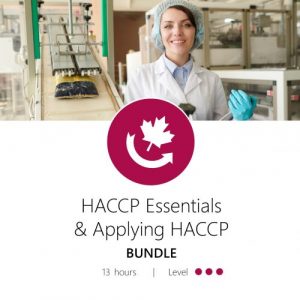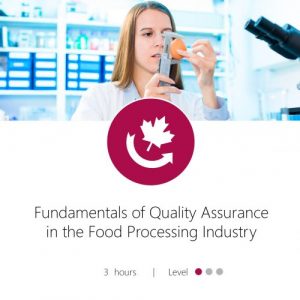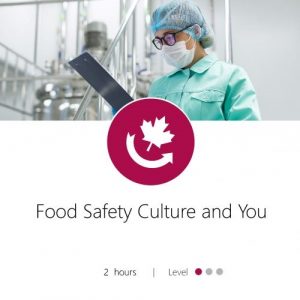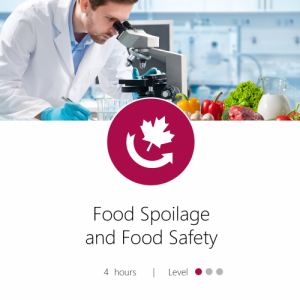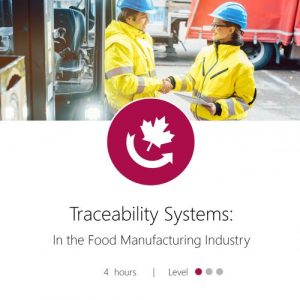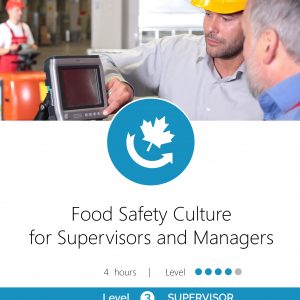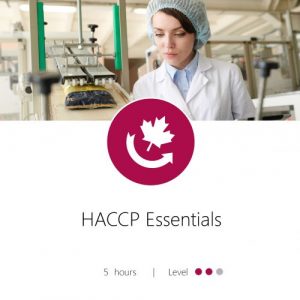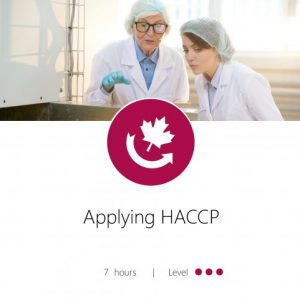-
HACCP Essentials and Applying HACCP
$399.00As HACCP has such a profound importance in Food and Beverage Manufacturing, we have prepared a 13-hour, two-part crash course in HACCP. This series will prepare individuals for successful careers in food safety by covering two courses: HACCP Essentials (6 Hours, $250 Value) This course provides background information on the Hazard Analysis Critical Control Point (HACCP) technique, describes the pre-requisite programs that provide the foundation for the HACCP system and explains the purpose and scope of HACCP training within the food processing industry. As part of this, the course reviews the causes of food contamination with emphasis on the prevention of biological contamination and identifies and explains the seven HACCP principles. Applying HACCP (7 Hours $250 Value) This course focuses on how to develop, apply and maintain Hazard Analysis and Critical Control Points (HACCP) in a facility. The goal of this course is to help prevent food safety issues before they happen, rather than afterwards. This training will provide knowledge and strategies which clients can use to successfully develop and implement a HACCP System in the food processing industry. *Become a member to receive 20% off -
Fundamentals of Quality Assurance in the Food Processing Industry
$375.00This course provides Quality Assurance Technicians and anyone interested in Quality Assurance in the food processing industry with: general knowledge and standard occupational skills necessary to successfully perform in this occupation. Quality Assurance is a critical function in the food processing industry, and this course provides food workers, at the Quality Technician level, with: general food safety and food quality assurance knowledge, strategies, practices, and tools. *Become a member to receive 20% off -
Food Safety Culture and You
$199.00This course discusses the importance of following food safety procedures and practices when working in Canadian food companies, as these are part of food safety culture. It outlines the role of governments and food companies in protecting the food supply and identifies how consumers can be negatively affected by improper practices. It covers the important role food workers have in following procedures and telling supervisors and coworkers of food safety problems. Participants will learn the important role of food workers have in supporting their workplace food safety culture. By following food safety practices, food workers help their employer to protect the consumer, meet government regulations and address business needs. *Become a member to receive 20% off -
Food Spoilage and Food Safety
$125.00This course describes the components of food safety, how food spoilage occurs, and how to prevent it. The course is designed to help new food workers understand their role and responsibilities in prevention and management of food spoilage and food safety. This knowledge is key to a successful career in the food industry. Knowing what causes food spoilage, when food is bad, how to prevent economic loss due to food spoilage and learning about employee’s role in keeping food safe is the most important skill to have when working with food. *Become a member to receive 20% off -
Traceability Systems in the Food Manufacturing Industry
$249.00The information the Traceability Program provides makes management of product recalls fast and effective, reduces risks of a food safety crisis, and demonstrates that the processor is a responsible manufacturer. This course demonstrates how to develop and implement a Traceability Program for a food processing facility. This course introduces users to the topic of traceability, examines the relationship between traceability and other food safety prerequisite programs and teaches how to design, implement and test the system to ensure it is fully functional. *Become a member to receive 20% off -
Food Safety Culture for Supervisors and Managers
$199.00This course discusses food safety culture in the workplace and the critical role effective communication, leadership and commitment have on protecting the food supply. Key concepts include identifying the elements of food safety culture, ways and tools to measure food safety. The importance of supervisor and manager active participation and commitment to food safety in creating a workplace environment that encourages desired food safety behavior. Participants will be able to demonstrate their ability to apply, analyze and evaluate facts, principles and concepts as well as show knowledge and comprehension of the material. -
HACCP Essentials
$250.00This course provides background information on the Hazard Analysis Critical Control Point (HACCP) technique, describes the pre-requisite programs that provide the foundation for the HACCP system and explains the purpose and scope of HACCP training within the food processing industry. As part of this, the course reviews the causes of food contamination with emphasis on the prevention of biological contamination and identifies and explains the seven HACCP principles. Part 1 of a 13-hour HACCP pairing. See Part 2: Applying HACCP *Become a member to receive 20% off -
Applying HACCP
$250.00This course focuses on how to develop, apply and maintain Hazard Analysis and Critical Control Points (HACCP) in a facility. The goal of this course is to help prevent food safety issues before they happen, rather than afterwards. This training will provide knowledge and strategies which clients can use to successfully develop and implement a HACCP System in the food processing industry. Part 2 of a 13-hour HACCP Pairing. See Part 1: HACCP Essentials *Become a member to receive 20% off


